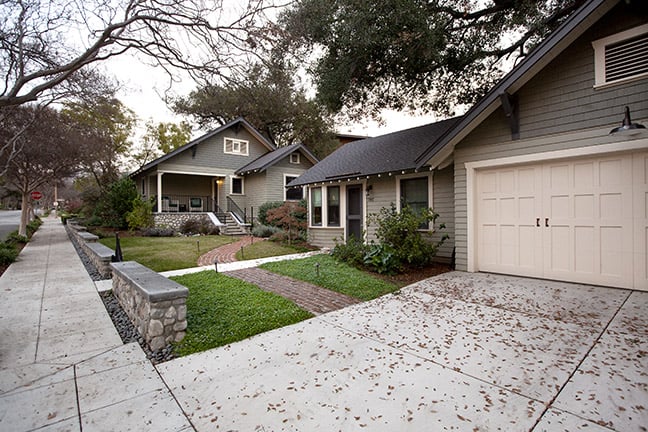Council approves ADU construction grants

The Claremont City Council approved a program that would provide $20,000 grants to homeowners who build ADUs on their properties if they agree to rent to moderate income people for three years. Courier photo/Steven Felschundneff
by Steven Felschundneff | steven@claremont-courier.com
Following a robust discussion, the Claremont City Council settled on a compromise solution for a new grant program to help facilitate the construction of more back houses, commonly known as “ADUs.”
With one unanimous vote the council on Tuesday approved a program that will award $20,000 to homeowners who agree to construct an accessory dwelling unit, or a junior accessory dwelling unit, on their property. The money will be allocated in the form of a forgivable loan which becomes a grant as long as the owner abides by certain conditions, including actually building the unit, living in the property’s main home, and agreeing to rent the ADU for three years to a moderately low-income person or family.
There will be no personal income cap for the program, meaning even the wealthiest Claremont residents could receive a grant. Also, after three years all restrictions expire, including the requirement to rent the unit.
The City Council attached two additional caveats to its approval, that the program be reevaluated in a year to ensure it functions as intended, and that city staff look into a similar initiative that would provide money to bring existing non-permitted ADUs into compliance.
Accessory dwelling units are freestanding, fully self-contained residential housing typically built in the backyard of an existing single family home. They have been identified by the state as an excellent way to diversify housing stock in nearly built out cities like Claremont. They also fill a key role in helping Claremont reach its housing construction targets set by Sacramento. Junior accessory dwelling units are also self-contained, but are built within the roofline of the existing home.

The Claremont City Council approved a program that would provide $20,000 grants to homeowners who build ADUs on their properties if they agree to rent to moderate income people for three years. Courier photo/Steven Felschundneff
But ADUs are expensive to build; the city estimates the cost to be at least $100,000 for a studio and up to $300,000 for a 1,000-square-foot, two-bedroom home. Junior ADUs can generally be built much more cheaply with estimates between $20,000 and $68,000. And given the high cost, some on the council questioned how much impact $20,000 would have toward the goal of actually getting property built.
The program will be funded for the first year with $200,000 of Claremont’s share of the American Rescue Plan Act, better known as the federal Covid stimulus bill. If the program is performing well the council could extend it by a year with an additional allocation of $200,000 from next year’s budget. This funding source adds additional complications to the program because all ARPA funds must be earmarked by the end of 2024 and spent by the end of 2026.
The rental rate would be based on the city’s Inclusionary Housing Ordinance for a moderate income family, which for 2022 caps a studio at $1,753; a one-bedroom at $2,005; and a two-bedroom at $2,255 per month. Income qualification uses a sliding scale depending on number of people in the household and beginning at $70,125 for a single person up to $108,240 for a family of five. Once the tenant is in place the rental terms, including annual rent increases and allowable evictions, would be covered by existing state law.
Homeowners must build the ADU prior to the expiration of the building permit or one year after receiving the grant, whichever is later. If the homeowner failed to abide by the guidelines of the agreement, then the city could ask for the money to be returned.
Council member Corey Calaycay asked City Manager Adam Pirrie what would happen to the grant money if a homeowner failed to live up to the agreement but the ARPA deadline had already passed.
“If we get to the end of the three years and they didn’t meet the requirement and you require them to pay back the loan and we have taken back ARPA money at 2026 and then what happens?” Calaycay asked.
“I think technically it would be required to be returned to the federal government,” Pirrie responded.
The ARPA money was intended to help people who truly suffered during the pandemic due to job loss, being forced to shutter a business, or even becoming seriously ill with COVID-19. As such, some of the council members bristled at the idea of giving federal dollars to Claremont residents who honestly do not need the money.
“You don’t want it to be a windfall for somebody who isn’t really in a situation that they’re suffering,” Calaycay said. “I just don’t want to give a gift to someone who otherwise will figure out how to [build the ADU]. But the money is there and they are eligible so they can take it. At least if we go with option A they have to agree to guarantee to rent it to a moderate income [family].”
He said if the program doesn’t result in getting money to people who truly need it he would be open to siphoning the funds to a direct rental assistance program similar to one the city ran in 2020.
Council member Jennifer Stark expressed a similar sentiment, saying the program must have an equity component. She was particularly against offering the grants on a first-come, first-served basis because, as she sees it, the wealthiest homeowners will be able to act the fastest.
There was also some concern among the council that certain people in the process of permitting an ADU are waiting to break ground until the council acts on the grant program in hopes of getting a boost from the city.
“I want to use every bit of our ARPA funds to help people who need help,” Stark said. “I don’t want it to go to people who very likely know this is coming and that is why they are not finishing their project because, why would they if they know they are about to get $20,000? I have nothing against people maximizing what they own to their benefit. I just don’t think we should subsidize it.”
Mayor Pro tem Sal Medina said he would like to increase the amount of each grant to create a meaningful offset of the construction costs but couple it with a more stringent requirement that the unit be rented to low-income people as opposed to moderate.
Council member Jed Leano said 90% of low-income people live in market rate housing which they pay through federal voucher programs, adding the problem across Southern California remains a lack of supply, so any program that gets housing built increases the overall stock of rental units in the area.
“I am supportive of this funding going toward either subsidy or supply, I think frankly we need both,” Leano said.
Pirrie said Claremont still has about $4 million in ARPA funds to distribute across a range of priorities, which could include a new rent subsidy program and one to help bring existing ADUs up to Claremont’s building standards.









0 Comments